75 years ago, on June 25, 1950, North Korean troops crossed the 38th Parallel boundary that separates the Korean Peninsula. When the troops poured into South Korea, they sparked what would be one of history’s most bloody wars, claiming the lives of over three million people, civilian and soldier alike. The fighting would come to an end in 1953, but the Korean Peninsula remains divided to this day.
Brought to the precipice by Cold War machinations, Korea was split in two in 1948. Some two years later, the armed conflict would begin with the North Korean troops' advancement. With the support of China and the Soviet Union behind North Korea, the United Nations soon felt pressure to contribute armed forces to the southern state. Although some 21 countries provided support of some form, the United States provided nearly 90% of the people who would fight on the United Nations' behalf. Over 35,000 American troops were killed—and nearly 8,000 remain missing.
To this day, the Korean War remains one of the least discussed wars despite its incredibly high body count. Despite its status as the "Forgotten War", a number of books have been written that explore the brutality of the war. Whether memoirs from the battlefield or strategic overviews, these Korean War books capture moving tales of bravery, perseverance, and determination alongside critiques of the political reality of the American entrance into the Korean War.
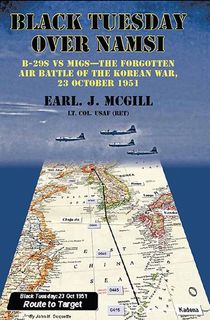
Black Tuesday Over Namsi
In an engrossing account of aerial warfare, Earl J. Hill conveys the clash between American bombers and North Korean jet fighters above Namsi. During more than five hours of combat, they would change the conduct of strategic aerial bombardment.
Despite experts assessing the battle as one of the most significant jet engagements in warfare, it has largely been overlooked in the broader scope of history. Hill, through a mix of historical documents and firsthand accounts, unravels the circumstances of the mission—and what was left in its wake.
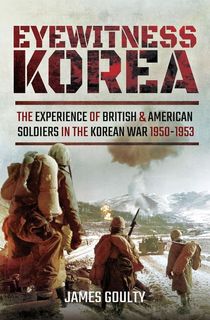
Eyewitness Korea
Drawing on firsthand history of the conflict, James Goulty depicts the overlooked experiences of British and American soldiers during the Korean War. Although many historians tend to focus on the impact of other 20th-century conflicts, at the time, the war was the center of public attention. Even more, it left the troops involved with degrees of trauma that Goulty takes into account through official documents, letters, and memoirs, depicting what the war was like for those on the front lines.
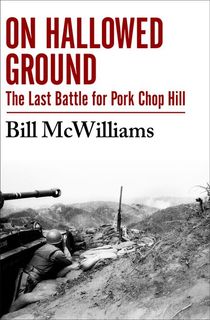
On Hallowed Ground
By the summer of 1953, the Korean War was already becoming known as the “Forgotten War”. The fighting had long come to a standstill, with peace negotiations dragged on and ultimately abandoned. Until soldiers tasked with rebuilding the outpost referred to as Pork Chop Hill engaged in five devastating days of combat with the Chinese 23rd Army, ultimately drawing the war to a close. Relying on classified documents and interviews, Bill McWilliams recounts the riveting story behind the battle and the soldiers and medics who heroically gave themselves to the cause.
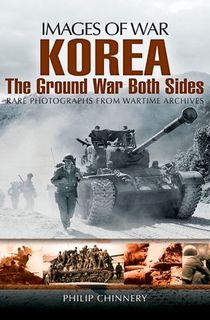
Korea
Told through rare archival photographs, military historian Philip D. Chinnery delineates the intense history of the Korean War. These images explore the war from numerous angles, beginning with the invasion of South Korea by the North Koreans in the summer of 1950 and ending with the arrival of the American and UN forces. What follows is an insightful and oftentimes devastating account of the brutal nature of war.
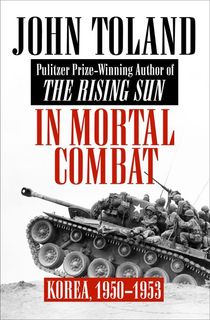
In Mortal Combat
From the Pulitzer Prize-winning author John Toland comes a powerful encapsulation of the Korean War. This text contains a history of the brutal war, completely with riveting accounts of the battlefield from soldiers on both sides of the war. With over two hundred interviews and incredible photographs from the time period, In Mortal Combat is a masterclass in both Korean War history and historical nonfiction.
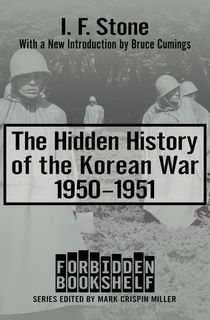
The Hidden History of the Korean War, 1950–1951
Stone, one of the most well-known investigative journalists of mid-century America, digs into the United States's involvement in the Korean War–discovering insight into how we ended up in the midst of a conflict on the other side of the world. This book is not for beginners to the history of the Korean War, as Stone assumes his reader is well-versed in the official outlines. By thoroughly examining U.S. intelligence actions before the war, Stone will make you completely rethink what you know about the Korean War in this compelling text.
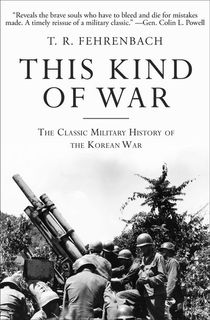
This Kind of War
T.R. Fehrenbach is best known for his highly readable histories of Texas. Born in the state, Fehrenbach's personal experience contributes to his compelling narratives. Similarly, Fehrenbach's service in the Korean War provides a moving subtext to his comprehensive history. In this powerful account, Fehrenbach not only gives readers detailed descriptions of bloody battle scenes, he also details the military and political shifts that led to loss of many lives during the war. Fehrenbach’s firsthand perspective of the war alongside balanced and thoughtful political critique makes for an unforgettable read.
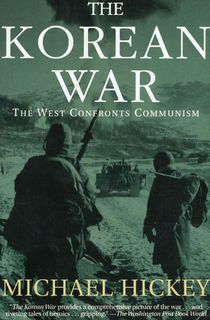
The Korean War
Winner of the Westminster Medal for military history, Michael Hickey delivers a thorough accounting of the Korean War, beginning with the scope international politics that led to the splinter and then delving down into the specifics of singular battles. The inclusion of declassified military documents adds context to Hickey's claims, while his status as an Englishman writing about a predominantly American-Korean conflict lends him some objectivity despite his own service.
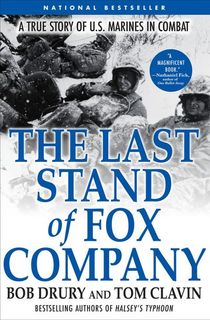
The Last Stand of Fox Company
Bestselling authors Bob Drury and Tom Clavin highlight one brutal battle during the Korean War that will readers stunned. After ignoring warnings from Mao Zedong, General MacArthur pushed his 10,000 troops deeper into North Korea. The squad was met with 100,000 Chinese soldiers who had MacArthur’s troops completely surrounded. Their only hope was Captain William Barber and his 234 Marines of Fox Company. This deeply gripping account of sacrifice and bravery will lend readers a sense of the utter brutality and the seeming lack of reason behind the Korean War. Cinematically written, you'll be on edge through every beat of the battle.

The Coldest Winter: America and the Korean War
David Halberstam, iconic author and journalist, offers his take on the Korean War with a powerful narrative of the decisions and mistakes that led to losses on both sides of the war. He offers a thorough timeline that captures each key battle, in addition to deeply-researched reports about the war’s prominent figures like Mao Zedong, President Eisenhower, and General MacArthur. One of the highlights in the book includes a riveting account from MacArthur’s fatal mistake in advancing towards the Yalu River, allowing Chinese forces to justify an intervention. Halberstam, who won a Pulitzer Prize for his reporting on the Vietnam War, spent ten years reporting on and writing this book.

South to the Naktong, North to the Yalu
This Korean War text by Roy E. Appleman offers a first person account of the first five months of the war. Appleman details a handful of key battles during the war which include the battle at the Pusan perimeter and MacArthur’s slow push through North Korea which led to disaster. Thanks to his firsthand perspective, Appleman’s words hit home as he holds nothing back while offering powerful descriptions about the warfront.

Valleys of Death: A Memoir of the Korean War
This extremely personal memoir comes from Bill Richardson, a Korean War vet who spent several months fighting, only to be captured and imprisoned by Chinese forces for almost three full years. Richardson’s tale is unique as it gives readers a first-person perspective of the captivity camps that contained thousands of American troops. In his account, Richardson offers grueling details of the starvation, torture, and interrogation sessions he faced during his time as a prisoner of war. Despite his awful experience, Richardson’s story highlights his incredible determination, as well as his powerful defiance in the face of danger.
Featured photo: Wikimedia Commons



